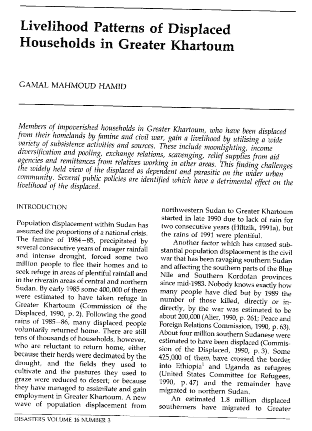
Members of impoverished households in Greater Khartoum, who have from their been displaced homelands by famine and civil war , gain a livelihood by utilising a wide variety of subsistence activities and sources. These include moonlighting, income diversification and pooling, exchange relations, scavenging, relief supplies from aid agencies and remittances from relatives working in other areas. This finding challenges the widely held view of the displaced as dependent and parasitic on the wider urban community . Several public policies are identified which have a detrimental effect on the livelihood of the displaced.
Resource collections
- Sudan humanitarian response
- UN Habitat - Urban Response Collection
- Urban Response - Urban Crisis Preparedness and Risk Reduction
- Urban Response Collection - Community Engagement and Social Cohesion
- Urban Response Collection - Economic Recovery
- Urban Response Collection - Environment and Climate Change
- Urban Response Collection - Housing, Land and Property
- Urban Response Collection - Urban Crisis Response, Recovery and Reconstruction
- Urban Response Collection - Urban Resilience